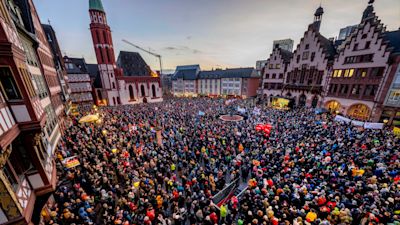German cities brought to standstill by mass protests against growing far-right AfD party

Protests were triggered by speculation about a potential far-right policy of so-called 're-migration', which would force asylum seekers out of the country, ITV News Europe Editor James Mates reports
The numbers are extraordinary. Routinely more than 100,000 people, sometimes, according to organisers, as many as 300,000.
Ordinary Germans, for the most part not the usual crowd you would see at political rallies, on the streets through the cold and wet of a north German winter expressing their opposition to the growing political power of the far right.
It is not just the surging electoral popularity of Alternativ für Deutschland (AfD) that is spooking them, but a revelation made by an online publication that senior AfD people were involved in discussions as to how to expel millions of immigrants from Germany based on race.
Some in the leadership of the AfD deny that these are their plans, and insist the party is being maligned as misrepresented by their opponents.
But many who follow far-right politics closely are not so sure, and believe what is said in private may be more revealing that what they say in public.
Interestingly, even Marine Le Pen of the French far right has publicly dissociated herself and her party from the AfD over this.
Since that news broke in mid-January there has been an upsurge in anti-AfD protests in towns and cities across the country basically saying that their tolerance of far-right politics is at an end.
To be anti EU, anti Euro, anti immigration is one thing, but to even entertain the idea of expelling millions of people because they are asylum seekers, recent immigrants, even German passport holders who have “failed to assimilate” – that is too much.
At a rally at the weekend in Berlin attended by upwards of 150,000, person after person said to me “it is our responsibility as Germans, because of our history, to oppose this”.
Polls suggest that support for the AfD has dipped slightly since the revelations hit the headlines, but they remain the second most popular party in Germany, and in several states of the former East Germany they are well out in front.
Those who oppose them are particularly fearful of the European elections coming up in June, which are always an opportunity for voters to make a protest vote and express their dissatisfaction with the government.
And then in September there are three regional elections in the former East Germany in which the AfD could easily enter state government for the first time.
This is not the 1930s, and the current Germany is a long way from Weimar Germany that failed so disastrously back then. But even so, millions of Germans, and to be honest millions elsewhere in Europe, have every reason to be super vigilant and super cautious.
Want a quick and expert briefing on the biggest news stories? Listen to our latest podcasts to find out What You Need To Know…